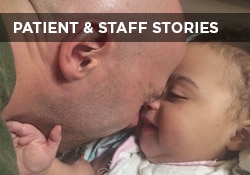This website uses cookies so that we can provide you with the best user experience possible. Cookie information is stored in your browser and performs functions such as recognising you when you return to our website and helping our team to understand which sections of the website you find most interesting and useful.

Susan E. Mazer, Ph.D. Blog
Thoughts and ideas on healthcare
Hi, and welcome to my blog! I'm Susan E. Mazer -- a knowledge expert and thought leader on how the environment of care impacts the patient experience. Topics I write about include safety, satisfaction, hospital noise, nursing, care at the bedside, and much more.
Caught Between the Healthcare Have & Have-Nots
May 31, 2013
 My husband Dallas and I are in Israel this week, on our way to Jordan and Qatar. A conversation came up around the differences between the U.S. healthcare system and the Israeli healthcare system.
My husband Dallas and I are in Israel this week, on our way to Jordan and Qatar. A conversation came up around the differences between the U.S. healthcare system and the Israeli healthcare system.
Currently in the U.S., you need insurance to make a doctor’s appointment. In Israel, you need only to call to make a doctor’s appointment.
Every Israeli citizen has health insurance that is paid for in the tax system according to his or her income level. Every American has no such guarantee — even with Obamacare, at least not yet. Yes, there is continual triage being done in treating those who are most critical. But, being “critically ill” is not addressed unless you walk into an emergency room, and even then, being admitted remains arbitrary.
In the Middle East and Asia, other countries have taken a more aggressive stand. Malasia has made it a national imperative that every citizen have access to healthcare regardless of whether he or she lives in village or a city.
In Qatar, all citizens will have healthcare insurance as of 2014. Visitors will have to pay for their insurance as an added cost to their entrance visa. Employers will have to pay for insurance for their foreign workers. But all 500,000 citizens and 1.5 million foreign workers will have insurance. Paying insurance does not necessarily lead to utilization, so all of us who visit or work in Qatar will be contributing to its health insurance fund.
Nonetheless, It remains troubling that healthcare in all countries has been reduced to policies, budgets, and, ultimately, some kind of litmus test. Whether citizenship, employment, or ability-to-pay, Americans have gotten used to either blindly trusting they have insurance or living with uncertainty. And, in this recent recession, the blinders came off for many long term career workers who lost their jobs and, subsequently, their health insurance benefits.
Taking this further, early retirement, prior to being eligible for Medicare, is in question for millions of Americans specifically because of the potentilal gap between employer based health insurance and government paid healthcare which does not kick in until the age of 65. And, those ‘gap’ years are treacherous for many.
I have no intention of retiring. Not because of the insurance, but because what I do is who I am — it is why I get up the morning and the core of many wonderful hours between Dallas and I when we dream up more to do. And, I love the people with whom I work. I am not alone.
However, where I feel privileged is where I can make this choice for the right reasons rather than defensively for fear some unknown health threat lurks ahead of me that could bankrupt my family.
How do you feel about this? How long do you want to work? On what basis can you make this kind of decision? What about your friends and neighbors?










